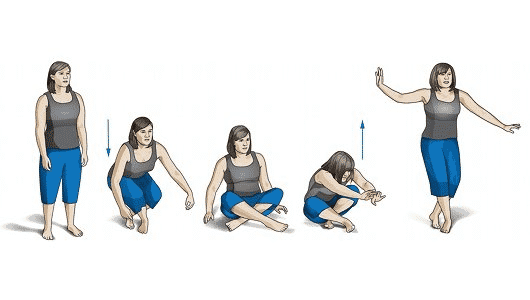A simple test, developed by Dr. Claudio Gil Araujo can predict with uncanny accuracy, how much longer a person over 50 is likely to live. The test, called the Sitting Rise Test (SRT), can be done in just moments. In fact, you can do it right now. The SRT predicts how long you 
- Follow the steps above to perform the SRT – How long do you have to live?
have to live based on your balance, strength, and flexibility.
How to do the Test
Wear loose-fitting clothing. If you have difficulty keeping your balance, get somebody to stand by to catch you if you lose your balance during the test.
-
Take your shoes off. Start from a standing position
-
Bend your legs, drop straight down to the floor. Do not use your arms or legs for leverage, don’t lean against anything
-
Sit in a cross-legged sitting position
-
Without using your arms, or leaning on anything, rise straight up, return to a standing position
How to Score the test
The SRT is scored on a scale of 1 – 10:
-
You get 5 points for going from standing to sitting position
-
You get 5 more points for returning to the standing position
-
Subtract 1 point each time you use an arm or knee to help you sit down or get up
-
Subtract a half point each time you lose your balance
-
Subtract a half point each time your movement becomes clumsy
What the test results mean
This test predicts your chances of dying early compared to a normal life expectancy. A score 8 points or less on the test indicates you’re about twice as likely to die within the next six years. People who score three points or less are five times more likely to die within that same time period. Each point you get on the test is worth a 21-percent decrease in mortality:
|
Points 10 9 8 7 6 5 4 3 2 1 0 |
Decrease in Mortality Risk% 100% 79% 64% 51% 40% 32% 25% 20% 16% 13% 0% |
The chart shows the percentage that your risk of dying in the next 6 years decreases with each point you earn.
What to do if you score poorly on this test
Don’t panic! If you’re reading this, there’s still time to make changes that will help you score better on this test. The great news is, each point you can add to your score increases your potential life expectancy by a greater amount than the previous point. Here’s what you need to do:
-
Posture – Good posture is essential to good health. Squat, don’t bend over. Sit up straight in your chair. Bend your knees slightly when you stand. Walk on the balls of your feet – not your heels! You are much less likely to slip and fall with good posture
-
Yoga, Tai Chi, Belly Dance, etc. – Balance is critical to life expectancy. Many older people die each year from complications after a fall. Exercises that emphasize flexibility, balance and graceful movement help you avoid falls
-
Hydration – People often lose flexibility as they age, but proper hydration can preserve it. Alkaline water hydrates better than plain water. Exercise pushes water into the joints, so the better you can hydrate your body, the more water it has to lubricate your joints
-
Diet – If you are carrying excess weight, it is interfering with your balance. We recommend an alkaline diet along with alkaline water if you’ve had a hard time dropping the pounds
-
Exercise – Passing this test calls for strength in addition to balance and flexibility. If you can’t lift yourself off the floor without help, speak with an athletic trainer so they can help you come up with an exercise plan.
Why this test works
Dr. Araujo noticed that many of his patients, especially older ones, had difficulty with simple feats of balance and strength. Balance and conditioning problems increase your risk of dangerous falls and accidents. They can also harm your cardiovascular health. Dr. Araujo theorized that a patient’s flexibility, balance and strength could be used as a measure of life expectancy.
To find out if he was right, Dr. Araujo tried this test out on more than 2,000 of his patients aged 51 to 80. He found that he was able to predict their life expectancy with “alarming accuracy.”
How Long do you have to live? That depends on you
If you are younger than 50 and scored poorly on this test, that should serve as a wake up call. You can choose to eat healthier foods, and drink healthier water. Taking a walk is a healthy alternative to sitting in front of the TV. If you are concerned about how you did on this test, you should speak with your doctor about the results.
We can help you choose healthier foods, water, and exercises. Call us today at 877-959-7977 for a free consultation with one of our healthy living experts.